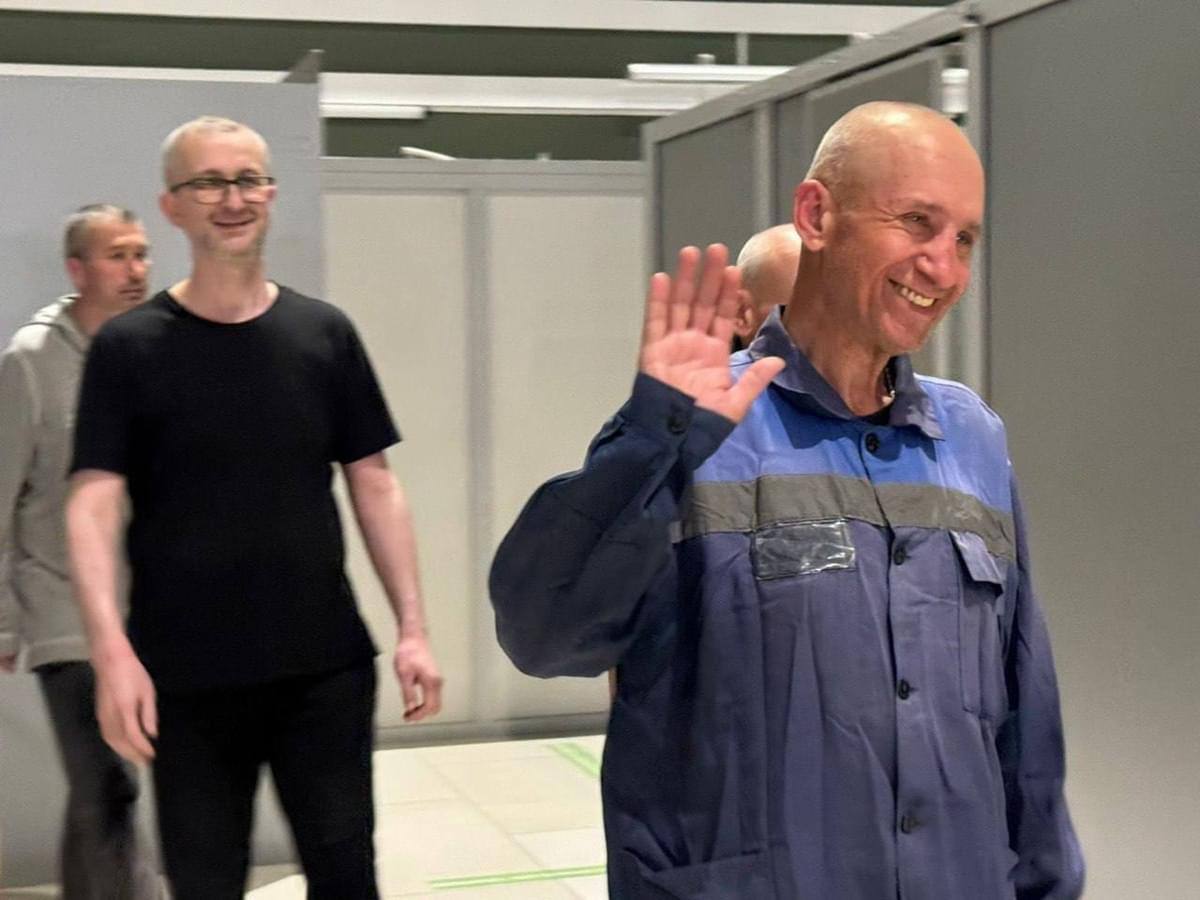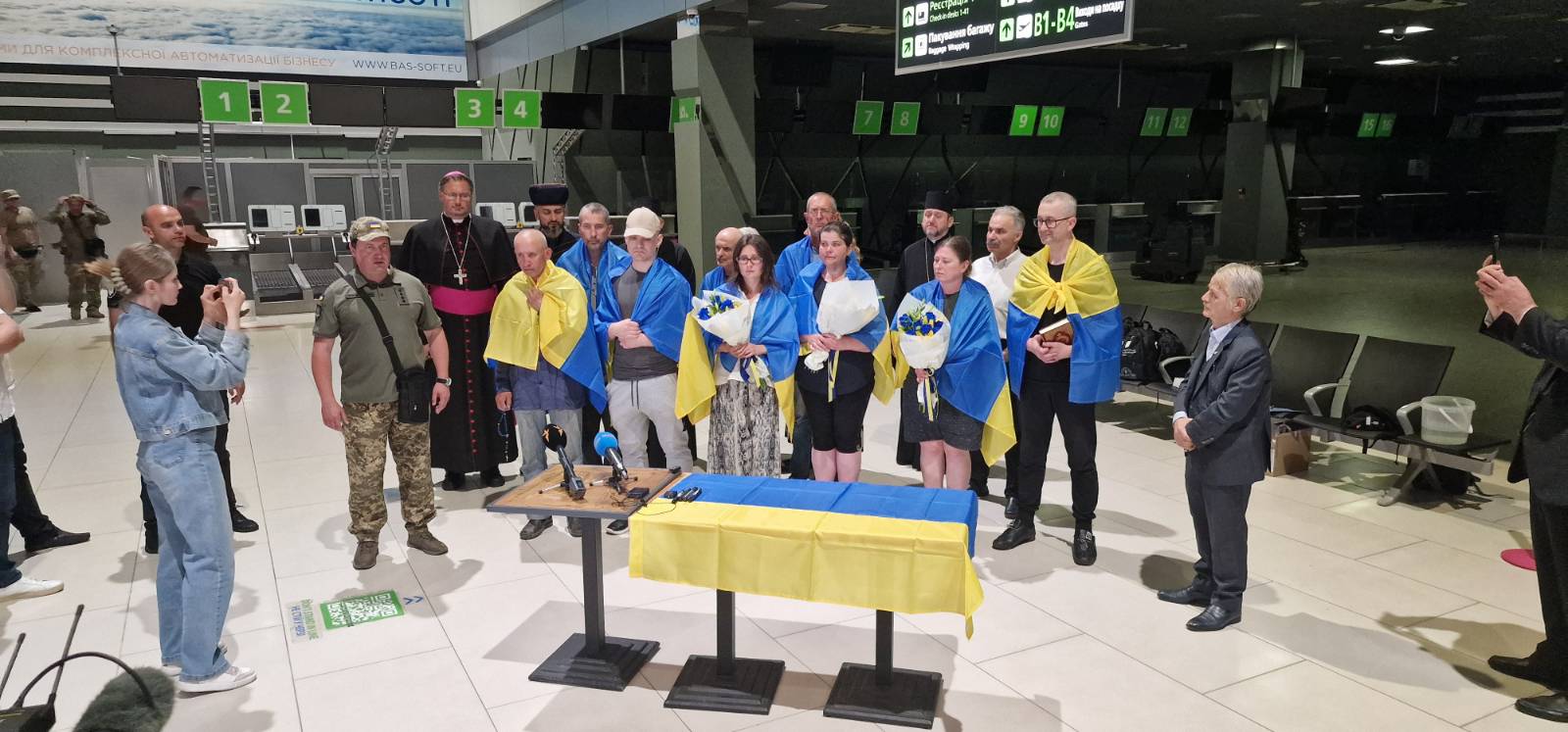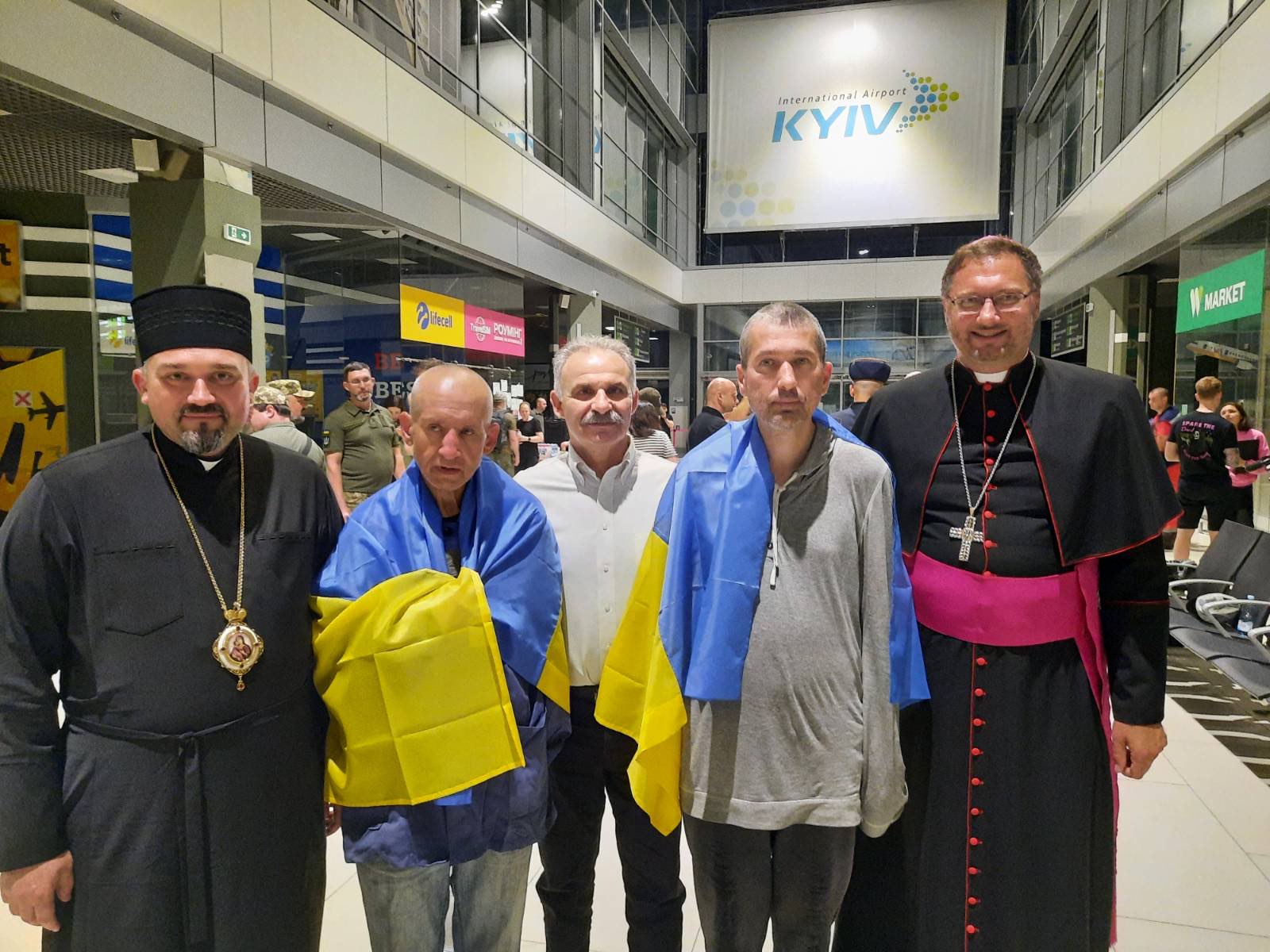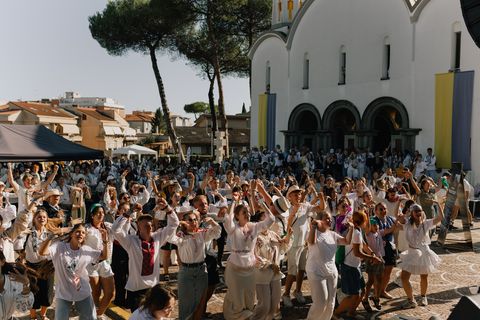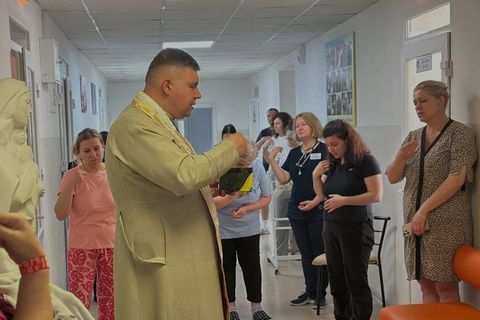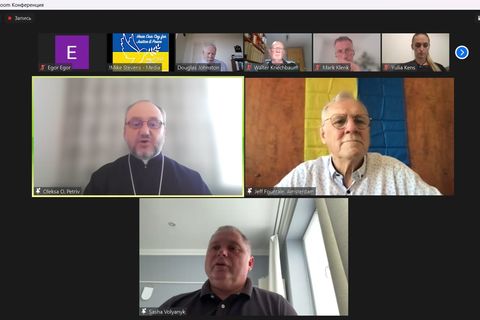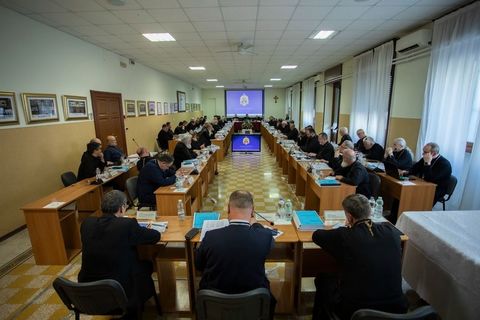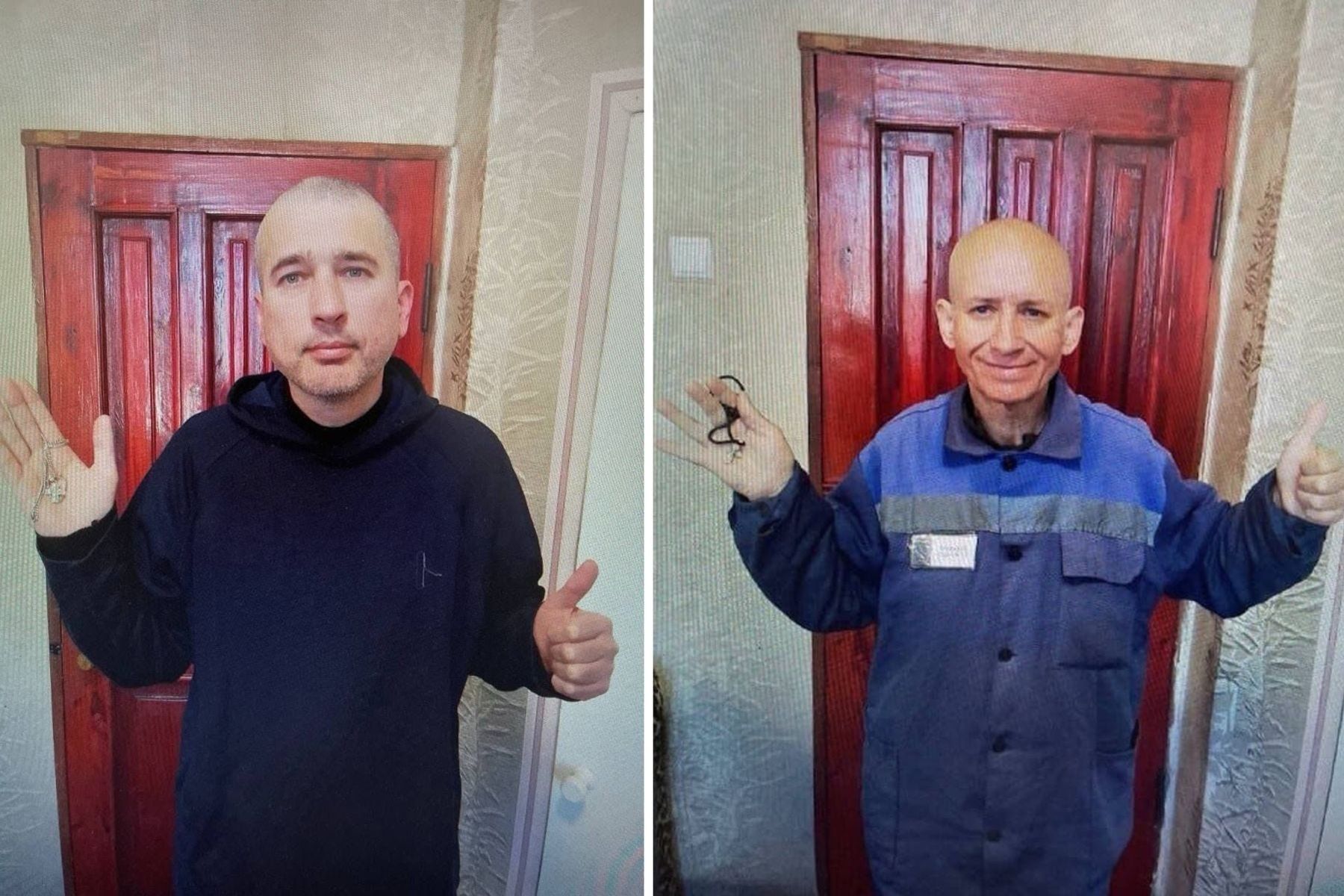
Ukrainian priest in Russian detention: ‘Their goal was to break us’
Nearly two years ago, two Ukrainian Greek-Catholic Redemptorists, Fr. Bohdan Geleta and Fr. Ivan Levytskyi, were arrested in Berdiansk, a southeasern Ukrainian city occcupied by Russian troops.
When Russian forces detained them on Nov. 16, 2022, the priests had been assigned for nine months to ministry at Nativity of the Blessed Virgin Mary Parish, where parishioners lived in chaos and fear amid the Russian occupation.
After the priests were detained, their Redemptorist order had little information about their whereabouts or physical condition. But whispers of hope persisted, even as the men remained imprisoned for a harrowing year-and-a-half.
The priests were released from Russian detention on June 28, 2024. While details remain unclear, it is widely believed that diplomats from the Holy See played a pivotal role in securing their freedom.
Both priests are now undergoing physical and psychological rehabilitation, as their period of detention left them with significant trauma.
Fr. Geleta told The Pillar that the priests arrived in Berdiansk in 2019, following the Redemptorist practice of rotating confreres every four years, and it was their turn to serve in southeastern Ukraine.
Geleta explained that the southeastern region of Ukraine is distinct, influenced by decades of Soviet atheist propaganda, which has left many people distanced from religion.
“We had different people in our parish,” Geleta told The Pillar. “There were ‘hereditary’ Greek Catholics — who had moved from western Ukraine at various times — who formed the backbone of our community and kept coming. There were also those who came to our church out of curiosity and ultimately discovered faith. Others included transplants from Donbas who had relocated after 2014, when the war began there.”
Geleta told The Pillar there was tension in the city on the eve of the 2022 invasion, although it didn’t escalate into open conflict. Some people, influenced by Russian propaganda, were anticipating the arrival of the “Russkyi mir.” But the outbreak of a full-scale war came as a shock to everyone.
“From the first day of the occupation on February 27, when invading troops entered Berdiansk, people began fleeing from Mariupol and Melitopol. They came to Berdiansk, where columns of buses and cars formed and departed toward Zaporizhzhia. Many people passed through—some families even spent the night with us before leaving. There was a lot of talk about destroyed houses and apartments. Some had lost friends,” the priest said.
“People were terrified; there was panic. People were dying. They didn’t know what to do or how to live, and the future was entirely uncertain. In those first weeks, we could have left safely, and we, too, felt fear and panic. But we were determined to stay here, to continue serving God and the people. We resolved to remain until the end. I offered Masses in the Roman Catholic church in Berdiansk and also offered Divine Liturgies in our church. Meanwhile, Fr. Ivan offered the liturgy in our church and went downtown to pray with people on the street,” Fr. Geleta recalled.
The priest said that in the early days after the invasion, fear and uncertainty drew local people to his parish — many of whom had previously seemed indifferent to religion.
And for their part, Russian occupation authorities did not interfere with parish activities for the first nine months.
But in November 2022, Russian authorities began police actions against religious communities, specifically targeting Greek Catholics and Protestants. During that time, three other UGCC priests in neighboring Melitopol were arrested and taken to the front line, where they were ordered to leave their parish communities, and move toward the Ukrainian troops.
“The people who remained came to [our parish], sharing various fears. Someone had been beaten, someone else killed, an apartment robbed—there was always something,” Fr. Geleta recalled.
“For nine months, we waited and prepared ourselves for when they would eventually come for us. We didn’t know when, but we were ready. And the people prepared us, too. It’s difficult to put it into words, but there was this inner feeling, a sense of faith. We were afraid, like everyone else, but this fear was controlled.”
On November 16, 2022, both priests were arrested by Russian authorities.
On November 24, the Russian military-owned propaganda channel Zvezda announced that Russian special forces had found weapons and explosives in a Ukrainian Greek Catholic Redemptorist house. At the time of the arrest, only Fr. Geleta was actually in that house, while Fr. Ivan was in the city center praying with people.
“That day, I was in the church, already vested to offer the liturgy. The arrest was very simple. Two men came in, masked and holding guns. They said they would check my documents and that I should go with them, and then I could return and continue [the liturgy]. And that was it,” Geleta recalled.
“At first, they couldn’t determine how to treat us—whether as religious persons or otherwise. They tried to convince us to cooperate, and when we refused, they accused us of terrorist activities. The investigator told me I would face 25 years in prison.”
According to Fr. Geleta, the most difficult part leading up to the arrest was the uncertainty of what lay ahead.
“When I was arrested, there was a sense of relief that it had finally happened, and that whatever would come, I would let it happen as God willed. Yet the uncertainty and anxiety continued, especially about Fr. Ivan, who had been arrested separately. We didn’t know about each other until four months later, when we were transported to another prison and were together for the first time in the transfer vehicle.”
“In the early days, the experiences were very intense because there was a torture chamber across from the cell, and we could hear voices and moans. I imagine Father Ivan was thinking about me, as I was thinking about him, wondering if I might hear his voice, if he was being tortured. I think that was the hardest part. The psychological pressure was immense.”
From the moment of their arrest, the priests were held separately in Berdiansk.
Father Geleta was placed in a cell designed for two, which held six to eight people at a time. Sometimes he had to sleep on the floor. Most of his cellmates were detained on suspicion of pro-Ukrainian activities, refusal to accept a Russian passport, or refusal to complete documentation for business, as well as retired military officers etc…
“In Berdiansk, we were not forbidden to pray, so we prayed in the cell. We talked about religious topics, about God, and we prayed constantly,” Geleta recalled.
“People sometimes asked difficult questions: Why did all of this happen? Where is God in it? It was very hard to answer. Actually, I didn’t even try to convince anyone. It’s very difficult to reason with someone when they’ve lost a loved one or endured tragedy and misfortune. Sometimes, it’s better to just sit in silence with them. But despite everything, I believe the Lord still worked through us.”
“There’s a kind of fear, almost animal-like, the fear of death, but the Lord always gives a person the strength to overcome it. In those moments, I’d feel this inner voice— ‘Stop, don’t be afraid; there’s nothing to fear. It’s all a test, an illusion.’”
“In that environment, we choose whether or not we’re afraid because we have an eternal soul. Fear often surfaces when we stray from truth, when we stop praying, or when we’re consumed with questions: Why? How? Why is there such injustice? That’s when true tragedy can settle within the soul, and the psyche may not be able to withstand it.”
According to the priest, during his entire imprisonment, he was never able to celebrate the Divine Liturgy, not even privately.
Cell inspections were thorough, with all items carefully checked whenever prisoners were taken out for brief half-hour walks, making it impossible to hide anything.
Prisoners also lacked access to reliable information about events outside; their only source of news was the sound of artillery, which indicated that Ukraine was still resisting Russian occupation.
From the moment of their arrest, the priests were held separately in Berdiansk.
Father Geleta was placed in a cell designed for two, which held six to eight people at a time. Sometimes he had to sleep on the floor. Most of his cellmates were detained on suspicion of pro-Ukrainian activities, refusal to accept a Russian passport, or refusal to complete documentation for business, as well as retired military officers etc…
“In Berdiansk, we were not forbidden to pray, so we prayed in the cell. We talked about religious topics, about God, and we prayed constantly,” Geleta recalled.
“People sometimes asked difficult questions: Why did all of this happen? Where is God in it? It was very hard to answer. Actually, I didn’t even try to convince anyone. It’s very difficult to reason with someone when they’ve lost a loved one or endured tragedy and misfortune. Sometimes, it’s better to just sit in silence with them. But despite everything, I believe the Lord still worked through us.”
“There’s a kind of fear, almost animal-like, the fear of death, but the Lord always gives a person the strength to overcome it. In those moments, I’d feel this inner voice— ‘Stop, don’t be afraid; there’s nothing to fear. It’s all a test, an illusion.’”
“In that environment, we choose whether or not we’re afraid because we have an eternal soul. Fear often surfaces when we stray from truth, when we stop praying, or when we’re consumed with questions: Why? How? Why is there such injustice? That’s when true tragedy can settle within the soul, and the psyche may not be able to withstand it.”
According to the priest, during his entire imprisonment, he was never able to celebrate the Divine Liturgy, not even privately.
Cell inspections were thorough, with all items carefully checked whenever prisoners were taken out for brief half-hour walks, making it impossible to hide anything.
Prisoners also lacked access to reliable information about events outside; their only source of news was the sound of artillery, which indicated that Ukraine was still resisting Russian occupation.
Anatolii Babynskyipillarcatholic.com
